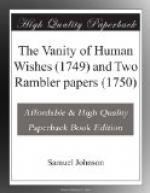I said to my soul, be still, and wait
without hope
For hope would be hope for the wrong thing;
wait without love
For love would be love of the wrong thing;
there is yet faith
But the faith and the love and the hope
are all in the waiting.
Wait without thought, for you are not
ready for thought:
So the darkness shall be the light, and
the stillness the dancing.
From The Vanity of Human Wishes:
Still raise for good the supplicating
voice,
But leave to heav’n the measure
and the choice,
Safe in his pow’r, whose eyes discern
afar
The secret ambush of a specious pray’r.
Implore his aid, in his decisions rest,
Secure whate’er he gives, he gives
the best....
Pour forth thy fervours for a healthful
mind,
Obedient passions, and a will resign’d;
For love, which scarce collective man
can fill;
For patience sov’reign o’er
transmuted ill;
For faith, that panting for a happier
seat,
Counts death kind Nature’s signal
of retreat:
These goods for man the laws of heav’n
ordain,
These goods he grants, who grants the
pow’r to gain;
With these celestial wisdom calms the
mind,
And makes the happiness she does not find.
The Vanity of Human Wishes is reproduced from a copy in the William Andrews Clark Memorial Library; the Rambler papers from copies in possession of Professor E.N. Hooker. The lines from T.S. Eliot’s Four Quartets are quoted with the permission of Harcourt, Brace and Company.
Bertrand H. Bronson University of California Berkeley
THE VANITY OF HUMAN WISHES.
THE
Tenth Satire of Juvenal,
IMITATED
By SAMUEL JOHNSON.
LONDON:
Printed for R. DODSLEY at Tully’s Head in Pall-Mall,
and Sold by M. COOPER in Pater-noster Row.
M.DCC.XLIX.
THE
TENTH SATIRE
OF
JUVENAL.
Let[a] Observation with extensive View,
Survey Mankind, from China to Peru;
Remark each anxious Toil, each eager Strife,
And watch the busy Scenes of crouded Life;
Then say how Hope and Fear, Desire and Hate,
O’erspread with Snares the clouded Maze of Fate,
Where wav’ring Man, betray’d by venturous
Pride,
To tread the dreary Paths without a Guide;
As treach’rous Phantoms in the Mist delude,




